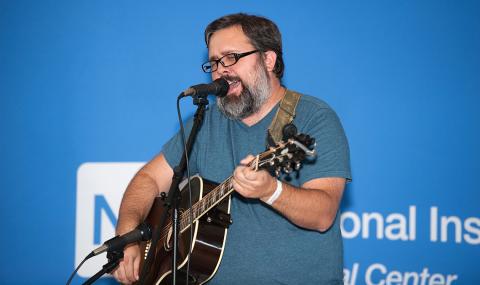Musician Milner Thanks NIH with Music

Photo: Marleen Van Den Neste
The tradition of grateful Clinical Center musician-patients who return to campus to give concerts was extended on July 26 when singer-songwriter Kevin Milner, 38, of Newport, Ky., played a noontime gig, mostly of his own compositions, in the atrium.
He was in town for a meeting with his medical team, including NICHD’s Dr. Karel Pacak, an authority on the rare tumor that inserted itself into Milner’s life utterly by surprise.
Milner was leading a musician’s life, touring the Midwest for much of the past 2 years and being a stay-at-home dad, when he learned that his little brother had a large tumor in his stomach. The cancer was successfully removed by physicians at the Mayo Clinic, but doctors there performed genetic tests showing that Kevin had a 50-50 chance of developing cancer himself.
“I had no symptoms at all,” said Milner, who credits geneticists at Dayton Children’s Hospital with finding the tumor that had developed, unbeknownst to him, in his chest and referring him to NIH. “They basically saved my life.”
Milner has a paraganglioma. It is scheduled to be removed in mid-August by NCI thoracic surgeon Dr. Chuang Hoang. Because of the tumor’s location in Milner’s chest, resecting it carries with it a 50 percent chance of depriving Milner of his voice. And perhaps his career.
Milner began playing guitar at age 18. He estimates he’s written more than 100 songs and is currently at work on his third album.
A native of Florence, Ky., he graduated from the University of Kentucky with a degree in political science.
“That explains why I’m a musician,” he observes.
He calls his music “death folk”; many of the lyrics deal with mortality.
“I perform mostly my own songs, but some of them are too dark for NIH, or have bad words,” he said. “My lyrics tend to have dark thoughts of impending doom, but that’s probably because of my disease.”
Milner first came to NIH last May; the July visit was his fourth.
The father of two daughters—ages 6 and 4 (the latter also carries a genetic mutation for cancer and “may be a patient here someday”)—Milner, like many musicians, has no health insurance.
“So I’m completely screwed,” he said. “That’s why I’m very appreciative to NIH. They saved my life. I’m really glad I got to play here.”
Milner planned to play one more gig in Indiana this summer before resting up for his surgery.
“I need to diet and exercise before the operation,” he said.
With his July performance, Milner joined a cadre that might be called the Grateful Living—musicians who came back to thank NIH with music. These include:
- Famed classical pianist Leon Fleisher, who was successfully treated for dystonia at the Clinical Center. He filled Masur Auditorium in late 2004 in a concert given in gratitude for the care he received here.
- Pianist and composer Clifford Smith, who said of the Clinical Center, “It is a holy place,” presented a concert of original music May 19, 2010, in the CRC atrium, in gratitude for successful treatment of prostate cancer.
- Musician/dancer Ian Baptiste of Trinidad and Tobago brought his dance troupe to Masur on Sept. 2, 2004, to thank NIH for treating his aplastic anemia.
“I could play one last show here,” Milner said hopefully as he packed his guitar for the flight back to Kentucky. But just before he left town, his NIH medical team moved his procedure from mid-October to mid-August, effectively ending the summer tour.
Find out more about Milner’s music at kevinmilnermusic.com.
